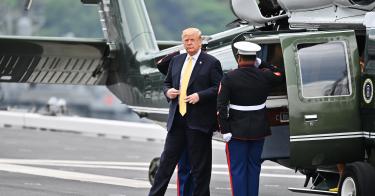When President Donald Trump said last month that the United States was dropping out of the arms trade treaty, The Washington Post sighed that it was “the latest illustration of his aversion to international agreements and world governance.”
Obviously, Trump doesn’t like some treaties. But would it surprise you to learn that he’s approved only one fewer treaty in his first two years than President Barack Obama did in his last two?
Here’s what Trump’s done — and what it means.
So far, the Senate has ratified and Trump has approved six treaties since March 2017. Now, the point of treaties is not to sign lots of them. The point is to sign good treaties. This isn’t a competition between Trump and Obama.
Sill, Trump has approved six treaties that the Senate has ratified. That doesn’t sound like a president who’s averse to international agreements. It sounds like a president who likes some treaties and not others.
What has Trump approved? Two boundary treaties with Pacific Island states; extradition treaties with Serbia and Kosovo; a protocol admitting Montenegro to NATO; and a treaty to make more books available in formats the blind can read.
Most of this isn’t sexy stuff, though the treaty on books for the blind is important, and admitting Montenegro to NATO is a milestone. But then, most of Obama’s treaties were also dull — two extradition treaties, three on legal cooperation, and one on the laws covering the cross-border sales of securities.
If Trump’s big wins have been books for the blind and NATO, Obama’s was a treaty on plant genetic resources aimed at improving food security. They’re all significant, but none of them will get you a Manhattan ticker-tape parade.
The United States enters into an astonishing number of international agreements. So far in 2019, we’ve signed 13 of them. The list of the U.S. bilateral treaties alone — not including multilateral treaties like NATO — runs to more than 500 pages.
Almost all of these are practical agreements, about everything from archaeological protection to the foreign treatment of Social Security payments. They’re meant to solve small, real problems. And because there are a lot of small, real problems in the world, there are a lot of small agreements.
And, that’s great. This is how diplomacy is supposed to work.
The Trump era hasn’t seen the death of the dull side of international agreements. And that’s the part that does most of the actual work. By and large, the big, bold treaties don’t do much heavy lifting.
Not all big, bold treaties are useless or bad. NATO’s a great example of one that works. So’s the World Trade Organization. But too many big treaties, like the one on the arms trade that Trump dumped, are merely symbolic statements.
We don’t do symbolism. When the United States ratifies a treaty, it becomes law. Under the Constitution, we’re not allowed to use treaties to signal virtue. We use them to make binding commitments.
Trump’s not averse to international agreements. He’s simply a skeptic about a few of those big, bold treaties. The Post’s belief that this amounts to a crisis of global governance is wrong. In fact, the meat of solving problems, as a nation and as individuals, is in the little things we do every day.
He is right to be skeptical. Those big, symbolic treaties aren’t how we do diplomacy as a nation. They contain promises we have no way of keeping, and no intention of keeping. They’re symbolic; they don’t work. And they’re a distraction from necessary, day-to-day diplomacy.
Trump’s not killing treaties. He’s killing the danger posed by the symbolic agreements he dislikes. By opposing them, Trump’s not opposing treaties. He’s paying them the compliment of taking them seriously.
This piece originally appeared in Newsday



